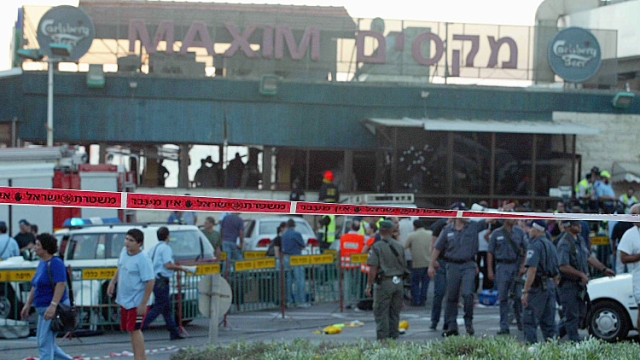On this day, October 4th, 2003, a tragic suicide bombing shook Haifa, claiming the lives of 21 individuals, both Jews and Arabs, and leaving approximately 60 others injured at the Maxim restaurant. Situated along the picturesque beachfront, this restaurant, co-owned by Jewish and Christian Arab proprietors, would forever remain a poignant symbol of coexistence in a region marked by conflict and tension.
The perpetrator of this horrific act was Hanadi Jaradat, a 28-year-old Palestinian woman, who detonated an explosive belt within the confines of Maxim. The blast sent shrapnel scattering throughout the restaurant, causing widespread devastation. Among the casualties were members of two families, including four innocent children, one of them a mere 2 months old.
Resistance fighters in Nablus showing off the homemade Qassam #2 rocket during the second #intifada 🇵🇸#FreePalestine#SahabatPalestina_ID#ForeverPalestine pic.twitter.com/SiP3CvKnnh
— ғᴏʀᴇᴠᴇʀ ᴘᴀʟᴇsᴛɪɴᴇ (@_ForeverPal_) October 1, 2023
The Palestinian Islamic Jihad claimed responsibility for this reprehensible act. It marked the sixth instance of a female suicide bombing during the Second Intifada, which had erupted in 2000, further deepening the cycle of violence in the region. In response, Israeli security forces took swift action, demolishing Jaradat's home and launching an airstrike on an Islamic Jihad and Hamas training camp located in Syria. Israel placed blame squarely on Yasser Arafat and the Palestinian Authority for the attack. Islamic Jihad cited the killing of its top officials in the preceding weeks as a motivation for the bombing.
The terrorist organization also sought to underscore what it saw as the vulnerability of Israeli security systems. Despite the tragedy, the resilient spirit of the people of Haifa prevailed. The Maxim restaurant was rebuilt and reopened, accompanied by the construction of a memorial nearby, serving as a poignant reminder of the day's tragic events.
This attack was just one of 23 suicide bombings that struck Israel in 2003. During this tumultuous period, various Palestinian militant groups, including Hamas, Islamic Jihad, PFLP, and Fatah's Al-Aqsa Martyr's Brigades, were involved in planning and executing politically motivated attacks of this nature.
An Islamic Jihad commander was eliminated in Jenin pic.twitter.com/JqVRU1kKUf
— Adin - עדין (@AdinHaykin1) March 16, 2023
What makes this particular tragedy even more heart-wrenching is the fact that its victims encompassed both Arabs and Jews, individuals who had been patrons of the restaurant and its dedicated employees, standing side by side in the face of terror. Over the years, this horrific incident came to be known among Israelis as "the family attack," as it claimed ten lives from two families, each of which endured the loss of three generations.
Tsiki Bahat, a young father at the tender age of 35, was one of the innocent souls tragically lost in this attack. As he rose to settle the bill, his wife Tova, their 6-year-old daughter Inbar, and 3-and-a-half-year-old son Hadar, who sustained severe injuries, remained seated at their table. For the two decades that have since passed, this grieving family has grappled with both the mental and physical scars inflicted by that fateful day.
Tova, reflecting on the life-altering event during an interview with "Israel Hayom," recounted their simple outing that day: "We spent time at the sea, like every Saturday, and then we went to a restaurant. We finished eating, and Tsiki got up to pay at the register. I was sitting with my back behind a pillar, and suddenly there was a huge explosion - followed by deathly silence."
In commemorating this painful chapter in history, we pay tribute not only to the victims but also to the indomitable spirit of resilience that has allowed Haifa, a city of diverse communities, to stand united in the face of adversity. It serves as a stark reminder of the enduring need for peace and coexistence in the region.


